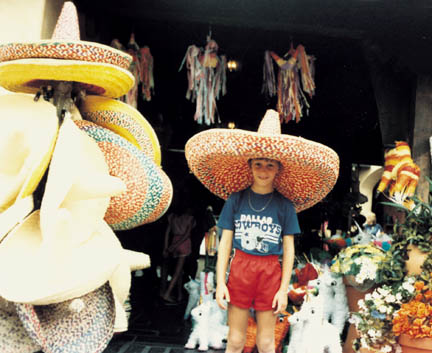

July 4, 1999. Washington, DC. Independence Day. 3:00 p.m. The afternoon reveled in its own oppressive humidity, celebrating itself with crackling bursts of heat lightning. Via electricity, life had been drawn from the primordial soup on such a day as this.
I walked the hazy, gentrified streets of Mt. Pleasant with Hammond Spitzer, my biographer. We had just completed a grueling session before the tape recorder and were in search of a friendly bodega offering reasonably priced bottled drink. Barking firecrackers, exploded by patriotic revelers thronging around the Monument to the south, became the aural backdrop of our thirst.
We stepped into a likely looking carry-out. I grabbed a ginger ale. Hammond, less adventurous, selected decaffeinated cola. We stepped towards the cash register.
"Hammond," I said as I was being rung up, "today the masses celebrate Independence Day. I do not sneer at their sentiment, but must ask you: what have we to celebrate? Less than three years ago, the streets of our fair neighborhood were filled with music. Projects were undertaken. Records were recorded. Shows were performed and taken on the road. A panoply of styles filled the air. Subversion of genre was the rule rather than the exception.
"Yet, at present, the environment seems somehow staler -- somehow less alive. Many giants we once knew have perished by their own hands. Those that survive seem sleepy and inactive. Hammond, what can be at the root of this problem?"
Hammond considered, counting his change. "Such concerns are no longer relevant," he said.
"Relevant? I do not understand your point." The door of the bodega opened. Hammond led the way back into the sultry street, unscrewing the cap of his cola as he spoke.
"Projects? Records? Shows and tours? Songs and those that sing them? These are modern ideas -- monuments to ego. Why create such oppressive, fascist narratives? We live in cool postmodern times and so must dream cool postmodern dreams. These have nothing to do with achievement, planning, so-called rationality and reason, and certainly not with activity. Documents pressed on vinyl or plastic are as translatable to our experience as Skylab to a mastodon. These days, folks would sooner cotton to the intangibility of streaming digital code."
I weighed his words. "But I remember a time when a more tasteful monuments could be made that seemed to stop short of hegemonic history-making. A record -- or rather, a recording's site -- became a transparent mirror of the past and a gateway to the future...an objective moment subjectively presented and subjectively interpreted...a fusion of meaning and its dissolution. Perhaps it was only a memory of a dream...or a dream of a memory of a dream...but I do remember it."
"Then your memory is a memory of mud," Hammond replied curtly. "It is a base memory. It is a savage memory. It is a barnyard memory. It lurks in the part of your brain that concerns itself with blinking and breathing. Because it is not an industrial memory, it cannot be a postindustrial memory. Because it is not a modern memory, it cannot be a postmodern memory. It is not fully explicable, but it is instinctual. It is mud memory," he concluded.
I looked up at the sky. A cloud circled the sun and shrugged its frosty shoulder. The afternoon was a starry-eyed Cinderella sliding into its glass slipper.
"Perhaps you're right," I said. "I guess I do have a mud memory."
[signed]
Justin Moyer
CEO/President
Mud Memory Records
Washington, DC
January 30, 2001